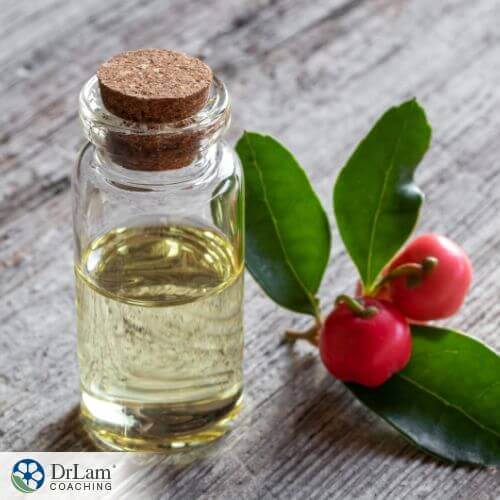Do you want to ease headaches or muscle pain? Many people use wintergreen oil, or wintergreen essential oil, for various types of body pain. It works to stop pain and inflammation. It has also been used as an antibacterial and for dental hygiene. But it comes with serious risks and potential side effects as well.
 Wintergreen comes from several types of plants in the genus Gaultheria, such as Gaultheria fragrantissima and Gaultheria procumbens. These shrubs generally stay green through the winter, thus the name. You can find it in India, Asia, and North America. Checkerberry, boxberry, and teaberry are some of its names. While wintergreen fruit can be eaten raw, it is also made into syrup, wine, or jelly.
Wintergreen comes from several types of plants in the genus Gaultheria, such as Gaultheria fragrantissima and Gaultheria procumbens. These shrubs generally stay green through the winter, thus the name. You can find it in India, Asia, and North America. Checkerberry, boxberry, and teaberry are some of its names. While wintergreen fruit can be eaten raw, it is also made into syrup, wine, or jelly.
The oil is produced by steaming the leaves. The main active ingredient is methyl salicylate. Manufacturers add it to products to kill, repel, or ward off insects. In contrast, others use it to make scents and flavorings. Examples are creams, lotions, mouthwashes, toothpaste, and candies.
The chemical methyl salicylate in wintergreen works like aspirin. Thus, it reduces swelling and pain when applied to the skin. Topically, it has been used for headaches, back pain, arthritis, and muscle cramps. Moreover, some studies show it may be used for dental hygiene.
The most common benefit is pain relief. However, studies say it may or may not work.
One study found methyl salicylate ointment helped a patient with severe headaches from electroconvulsive therapy. Other studies suggest wintergreen oil as a therapeutic option for lower back pain. Yet another study of 208 participants applied a patch containing methyl salicylate for 8 hours, and found it relieved mild muscle strain more than placebo.
But a large review found the oil didn't make a notable difference in pain and noted that better-designed studies are needed.
Researchers point out it may and may not work. But two studies support the antibacterial efficacy of the oil.
One study used Gaultheria procumbens grown in Poland. The results show its moderate antibacterial effect against pathogens. These are gram-negative and -positive bacteria. These bacteria can cause food poisoning, pneumonia, and infections.
Feng et al. in 2017 found that wintergreen oil was one of the best five oils tested for eradicating the Borrelia burgdorferi agent implicated in Lyme disease in lab tests, although it was needed at high concentrations and was not as effective as oregano oil or cinnamon bark.
Other studies found it had no effects on bacteria, however.
Wintergreen oil may ease gum pain and toothache. In addition, the FDA determined it to be safe to use for products like mouthwashes or rinses. It works well with other essential oils like menthol, thymol, and eucalyptol. However, you should avoid swallowing it since the oil poses health risks.
You can buy products with wintergreen oil over the counter, but the FDA does not regulate its use. So, it can cause harm if used topically in large doses or taken by mouth.
Do not consume this oil. It is fine used in minuscule amounts as a flavoring in certain foods, but generally, it is only safe for topical use.
Note that the oil cannot be applied undiluted directly to the skin. Doing so can result in irritation and toxicity. It should be diluted with carrier oils. These carriers come from plants that "carry" the oil to the skin. Examples are jojoba and grapeseed oils.
It is potent and absorbed through the skin. So it can irritate or inflame your skin. Side effects are similar to an allergic reaction. It makes your skin red and itchy.
Wintergreen oil can be deadly in large amounts. Children are most vulnerable since they can accidentally drink it. Thus, keep the oil out of reach.
 The active ingredient methyl salicylate can be toxic. Thus, you must be cautious when using it. Applying it to your skin is safe. But applying too much of it for prolonged periods can be harmful. Also, ingesting it in large doses can be poisonous.
The active ingredient methyl salicylate can be toxic. Thus, you must be cautious when using it. Applying it to your skin is safe. But applying too much of it for prolonged periods can be harmful. Also, ingesting it in large doses can be poisonous.
Avoid using the oil on toddlers below two years old. At the same time, pregnant and breastfeeding people should not take it.
You should also avoid it if you are on blood thinners, have bleeding disorders, or are allergic to aspirin. It is also not safe to use for aromatherapy.
Seek medical advice if you intend to use the oil while taking certain medications. It can moderately interact with other drugs.
People have reported cases of skin toxicity. It happens when your body quickly absorbs the oil. Moreover, it can be lethal if taken in large doses.
Applied to the skin, it can cause vomiting, ringing in the ears, and rapid breathing. Studies have found that topical applications can be misused and result in accidental poisoning. These topical applications include patches, microneedles, and other transdermal procedures.
Warfarin or Coumadin prevents the clotting of blood. If you are taking this anticoagulant, wintergreen also thins the blood. As a result, you can experience bleeding and bruising. People who have blood disorders like hemophilia should also avoid using it. The same effects happen when using medicines for blood clotting disorders such as Anisindione or Dicumarol for deep vein thrombosis.
It interacts with aspirin. Avoid taking both together since it increases the risk of side effects. People who have an aspirin allergy may experience an allergic reaction, too. Symptoms include itchy skin, runny nose, and swollen face. In severe cases, you can have difficulty breathing or asthma.
Wintergreen oil acts as an analgesic, anti-inflammatory, and antioxidant. It has been found to relieve pain in some studies, and pain is an inflammatory symptom. Additionally, inflammation can also be seen in arthritis and joint pain conditions. One study suggests methyl salicylate inhibits pro-inflammatory mediators. As a result, it reduces inflammation and injury to the joints.
Oloyede, in 2016, found methyl salicylate acts as an antioxidant, antimicrobial, and antifungal in lab tests. This may help explain some of its anti-inflammatory actions.
In sum, this oil eases pain and inflammation, which helps your body's Inflammation Circuit. This forms part of the NeuroEndoMetabolic (NEM) Stress Response. The six circuits play a role in fighting stress. If left unattended, chronic stress can lead to overworked adrenals, a condition called Adrenal Fatigue Syndrome. This syndrome causes various health problems. So, it is crucial to keep the Inflammation circuit healthy.
Medical practitioners recommend external use only. Ingesting it can be dangerous for your health.
A crucial step is blending it with carrier oils like jojoba, coconut, or olive oil to dilute it. Wintergreen oil should only make up about 2 percent of the final solution you plan to apply to your skin. That's about 3 teaspoons carrier oil to 7 drops of wintergreen oil. You could also combine it with a few drops of other oils like eucalyptus, lavender, and peppermint oils.
Talk to your doctor about the correct dose, concentration, and dilution for your intended use.
Wintergreen oil can subdue localized pains. It works best for muscle aches, arthritis, and some headaches. Moreover, it serves as an anti-fungal and antibacterial for your skin.
However, you have to be cautious when using it since it can be toxic. Large doses and prolonged use can cause skin discomfort or severe symptoms.
For more info on other natural ways to deal with pain and inflammation in a free consultation, you can talk to the Dr. Lam Coaching Team at +1 (626) 571-1234. Or you can also send us a private message here.
Wintergreen oil works to relieve headaches, lower back pain, and muscle pains. It is used as an anti-fungal and antibacterial too. You can find it in many beauty and dental hygiene products. However, it is best used topically. Ingesting it can be fatal.
